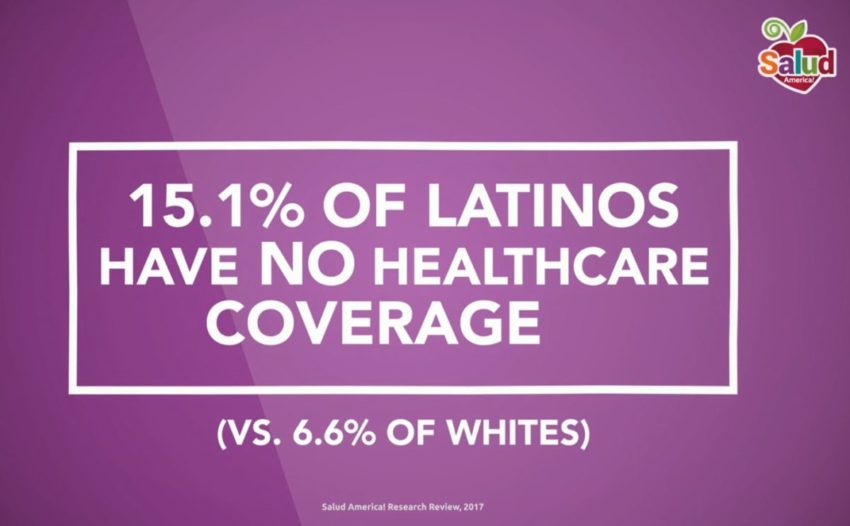Building better support for Latino families—from access to early education to greater health care—can improve Latino cognitive and health outcomes.
By Cliff Despres
One in three Latino families live in poverty and face dangerous gaps in early care and education, health care and social support, making it harder for Latino kids to achieve academically, socially and physically, according to a new research review from Salud America!, a national network for healthy change at UT Health San Antonio.
Salud America! Building Support for Latino Families examines the latest science on the state of social support for Latino families, and policy recommendations to improve support.
An animated video summarizes the research.
The research shows Latinos are more likely than their peers to have “toxic stress” at home, lack health insurance (15.1 percent to 6.6 percent), and earn less than $15 an hour (60 percent versus 39 percent) or have a low income, which is known to shorten life expectancy.
Latino kids face a 25-percentage-point gap in early cognitive development compared to white kids.
Fortunately, several solutions are emerging, according to the research:
— Latino kids who participate in early care and education centers match or exceed their peers in academic and social gains.
— In Head Start centers that also serve as resource hubs for early care, health care and family support, kids showed improved cognitive/social development, higher high school graduation rates, higher college entry rates, higher earnings and better health.
— School programs with promotores de salud (community health workers) boost Latinos’ uptake of health care services.
“Whole-family approaches that connect Latino kids and parents to culturally relevant support can improve early education, income and home environments,” said Amelie G. Ramirez, Dr.P.H., lead author of the research review, and director of Salud America! and the Institute for Health Promotion Research at UT Health San Antonio.
More than 38 percent of Latino children ages 2-19 have an unhealthy weight, compared to 28.5 percent of white youth and 35.2 percent of black youth.
This situation is compounded by poverty and a lack of social support.
The Building Support for Latino Families research review suggests policy and practice changes:
— Promote availability of, access to and awareness of center-based early care and education among Latino families.
— Develop “community schools” that combine classroom teaching with on-site early childhood education programs, family wellness centers and educational support, which helps low-income groups achieve greater academic and wellness gains.
— Create “medical homes” with promotores and home visits to enhance Latinos’ access to disparity-busting preventive care and physical, emotional and behavioral wellness.
In addition to the new research, Salud America! has Family Support stories, tools, and actions to inspire people to drive healthy changes to build family support.
For example:
— Watch how a San Antonio group goes door to door to give Latinos a medical home.
— Watch how Oregon embedded a health navigator in schools to aid Latino parents.
— Watch how a Minnesota teacher requires students to actively meet Latino health needs.
— Read how a San Francisco group fought for affordable housing for Latinos.
— Read how a Houston tech guru uses telehealth to boost Latino health.
— Use the Salud America! Action Pack to push for your big idea for change.
— Use the Salud America! Salud Report Card to learn health issues impacting your town.
“Meeting Latinos’ specific social, educational and economic needs is essential for the proper development of children, and critical for building a culture of health in this country as the Latino population continues to rise,” Dr. Ramirez said.
Access the full Salud America! “Building Support for Latino Families” research review at http://salud-america.org/building-support-for-latino-families-research.
Salud America! released its Mental Health & Latino Kids research review and video on Sept. 12, 2017, and will release a new research review and video on enhancing early childhood development for Latino children on Nov. 14, 2017.
About Salud America!
Salud America! is a national Latino-focused organization that creates culturally relevant and research-based stories, videos and tools to inspire people to start and support healthy changes to policies, systems, and environments where Latino children and families can equitably live, learn, work and play. Latinos are a rising U.S. powerhouse, but they face barriers to be their healthiest and suffer high rates of obesity and other health disparities. Salud America! and its award-winning multimedia communications help our social and online network—more than 125,000 moms and dads, providers, researchers, and community and school leaders—push for healthy changes in schools and communities for Latino and all kids. Salud America! is led by health disparities researcher Amelie G. Ramirez, Dr.P.H., and supported by a passionate team of communicators at UT Health San Antonio, thanks to funding from the Robert Wood Johnson Foundation. Visit Salud America! at salud-america.org or on social media @SaludAmerica.
About UT Health San Antonio
The University of Texas Health Science Center at San Antonio, with missions of teaching, research and healing, is one of the country’s leading health sciences universities and is now called UT Health San Antonio™. UT Health’s schools of medicine, nursing, dentistry, health professions and graduate biomedical sciences have produced more than 33,000 alumni who are advancing their fields throughout the world. With seven campuses in San Antonio and Laredo, UT Health San Antonio has a FY 2018 revenue operating budget of $838.4 million and is the primary driver of its community’s $37 billion biomedical and health care industry. For more information on the many ways “We make lives better®,” visit www.uthscsa.edu.


